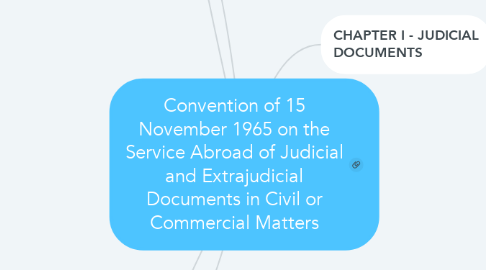Convention of 15 November 1965 on the Service Abroad of Judicial and Extrajudicial Documents in Civil or Commercial Matters
by Jennyfer Rubio

1. CHAPTER II – EXTRAJUDICIAL DOCUMENTS
1.1. ARTICLE 17: Extrajudicial documents emanating from authorities and judicial officers of a Contracting State may be transmitted for the purpose of service in another Contracting State by the methods and under the provisions of the present Convention.
2. CHAPTER III – GENERAL CLAUSES
2.1. ARTICLE 18: Each Contracting State may designate other authorities in addition to the Central Authority and shall determine the extent of their competence. The applicant shall, however, in all cases, have the right to address a request directly to the Central Authority. Federal States shall be free to designate more than one Central Authority.
2.2. ARTICLE 19: To the extent that the internal law of a Contracting State permits methods of transmission, other than those provided for in the preceding Articles, of documents coming from abroad, for service within its territory, the present Convention shall not affect such provisions.
2.3. ARTICLE 20: The present Convention shall not prevent an agreement between any two or more Contracting States to dispense.
2.4. ARTICLE 21: Each Contracting State shall, at the time of the deposit of its instrument of ratification or accession, or at a later date, inform the Ministry of Foreign Affairs of the Netherlands
2.5. ARTICLE 22: Where Parties to the present Convention are also Parties to one or both of the Conventions on civil procedure signed at The Hague on 17th July 1905, and on 1st March 1954, this Convention shall replace as between them Articles 1 to 7 of the earlier Conventions.
2.6. ARTICLE 30: The present Convention shall remain in force for five years from the date of its entry into force in accordance with the first paragraph of Article 27, even for States which have ratified it or acceded to it subsequently.
2.7. ARTICLE 31: The Ministry of Foreign Affairs of the Netherlands shall give notice to the States referred to in Article 26, and to the States which have acceded in accordance with Article 28
2.8. ARTICLE 28: Any State not represented at the Tenth Session of the Hague Conference on Private International Law may accede to the present Convention after it has entered into force in accordance with the first paragraph of Article 27.
2.9. ARTICLE 27: The present Convention shall enter into force on the sixtieth day after the deposit of the third instrument of ratification referred to in the second paragraph of Article 26.
2.10. ARTICLE 26: The present Convention shall be open for signature by the States represented at the Tenth Session of the Hague Conference on Private International Law.
3. Is a multilateral treaty which was adopted in The Hague, The Netherlands, on 15 November 1965 by member states of the Hague Conference on Private International Law.
4. STATE PARTIES As of July 2017, 73 states are contracting parties of the Hague Service Convention. They include 61 of the 82 Hague Conference on Private International Law member states in addition to 12 other states
5. CHAPTER I - JUDICIAL DOCUMENTS
5.1. ARTICLE 2: Each Contracting State shall designate a Central Authority. Each State shall organise the Central Authority in conformity with its own law.
5.2. ARTICLE 3: The authority or judicial officer competent under the law of the State in which the documents originate shall forward to the Central Authority of the State addressed a request. The document to be served or a copy thereof shall be annexed to the request. The request and the document shall both be furnished in duplicate.
5.3. ARTICLE 4: If the Central Authority considers that the request does not comply with the provisions of the present Convention it shall promptly inform the applicant and specify its objections to the request.
5.4. ARTICLE 5: The Central Authority of the State addressed shall itself serve the document or shall arrange to have it served by an appropriate agency
5.5. ARTICLE 6: The Central Authority of the State addressed or any authority which it may have designated for that purpose, shall complete a certificate.
5.6. ARTICLE 16: When a writ of summons or an equivalent document had to be transmitted abroad for the purpose of service, under the provisions of the present Convention, and a judgment has been entered against a defendant who has not appeared, the judge shall have the power to relieve the defendant from the effects of the expiration of the time for appeal from the judgment if the conditions enlisted are fulfilled.
5.7. ARTICLE 14: Difficulties which may arise in connection with the transmission of judicial documents for service shall be settled through diplomatic channels.
5.8. ARTICLE 12: The service of judicial documents coming from a Contracting State shall not give rise to any payment or reimbursement of taxes or costs for the services rendered by the State addressed.


